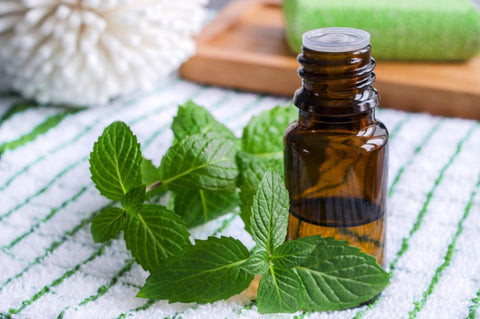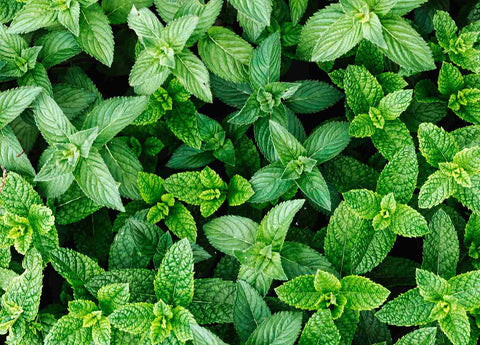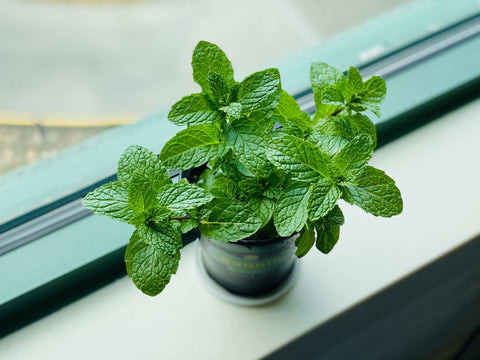Does Peppermint Oil Keep Flies Away? Yes, peppermint oil is a natural and effective way to repel flies, providing a pleasant alternative to harsh chemicals. At flyermedia.net, we explore how this essential oil can help you maintain a fly-free environment. Discover the benefits of peppermint oil for pest control, its various applications, and other natural fly deterrents.
1. Why Are Flies Attracted to Your Home?
Understanding why flies invade your home is the first step in effective fly control.
Flies enter homes for several reasons:
- Food Sources: Common house flies are drawn to decaying food and feces, while fruit flies love overripe fruit, spilled sugary drinks, and other sweet substances.
- Moisture: Drain flies seek moisture and organic materials in sinks, toilets, and drains to lay their eggs.
- Easy Access: Open windows and doors, especially during warmer months, provide easy entry points for flies to wander in.
Addressing these attractants is crucial for long-term fly control. Regular cleaning, proper food storage, and fixing leaks can significantly reduce fly infestations.
2. Why Is It Important to Get Rid of Flies?
While flies might seem like a minor nuisance, they can pose significant health risks.
According to experts, there are over 120,000 species of flies worldwide, with entomologists estimating a staggering 17 million flies for every person on Earth. While coexistence might seem inevitable, flies can quietly threaten the health and safety of your home.
Flies are not just annoying; they can spread diseases and contaminate food:
- Disease Vectors: Flies carry bacteria and viruses, transmitting diseases like E. coli, cholera, food poisoning, tuberculosis, dysentery, eye infections, and typhoid fever.
- Contamination: Flies often land on food, defecating and regurgitating, which can introduce harmful pathogens.
- Breeding Grounds: Flies thrive in dark, moist spaces, laying eggs in unsanitary areas.
Controlling fly populations is essential for maintaining a healthy and safe living environment. Regular cleaning, proper waste disposal, and natural deterrents like peppermint oil can help minimize these risks.
 Peppermint sprig next to an amber glass bottle
Peppermint sprig next to an amber glass bottle
Alt: Peppermint oil in amber bottle with fresh peppermint sprig, natural fly repellent
3. What Diseases Can Houseflies Spread?
Houseflies are known carriers of numerous diseases, posing a significant threat to public health.
Some of the diseases that houseflies can spread include:
| Disease | Description |
|---|---|
| E. coli | Bacterial infection causing severe stomach cramps, diarrhea, and vomiting. |
| Cholera | Acute diarrheal infection caused by contaminated food or water. |
| Food poisoning | Illness caused by consuming contaminated food. |
| Tuberculosis | Infectious disease that typically affects the lungs. |
| Dysentery | Infection of the intestines causing diarrhea with blood. |
| Eye Infections | Infections affecting the eyes, such as conjunctivitis. |
| Typhoid fever | Bacterial infection causing high fever, stomach pain, and headache. |
Understanding these risks underscores the importance of effective fly control measures. Proper sanitation, food handling, and fly deterrents are essential for preventing the spread of these diseases.
4. Does Peppermint Oil Repel Flies Effectively?
Peppermint oil is a powerful, natural repellent for flies and other insects due to its strong scent.
Yes, peppermint oil is an effective natural fly repellent because flies dislike its strong scent. Spraying peppermint oil around your home can deter flies and encourage them to seek alternative locations. Studies have shown that flies avoid areas treated with peppermint oil.
One study presented flies with a choice between a candle with juice and a candle wick with juice and peppermint oil. The flies consistently avoided the wick containing peppermint oil, opting for the plain juice. Another study found that peppermint oil significantly reduced lice on buffalos, demonstrating its effectiveness against other insects.
While lice are not flies, this demonstrates how effectively peppermint oil can work with other types of insects, which can make its deterrent properties transferable.
Peppermint oil’s effectiveness stems from its active compounds, such as menthol and menthone, which interfere with insects’ olfactory receptors, making it an excellent choice for natural pest control. According to research from Embry-Riddle Aeronautical University, in July 2025, P provides Y.
5. How to Make Peppermint Oil Spray for Flies?
Creating your own peppermint oil spray is a simple and effective way to control flies in your home.
Here’s how to make your own peppermint oil spray:
- Combine Ingredients: Add 10-20 drops of peppermint essential oil to a glass spray bottle.
- Add Liquids: Pour in 50-100ml of distilled water and 50-100ml of white vinegar.
- Mix Well: Seal the bottle and gently shake to combine the ingredients.
- Spray: Use the spray in areas where you want to deter flies, such as door frames, window sills, rubbish bins, and bathrooms.
This homemade spray provides a natural and safe way to keep flies away without using harmful chemicals. Regular application will help maintain a fly-free environment.
 Overhead view of peppermint plants
Overhead view of peppermint plants
Alt: Fresh peppermint plants, natural insect repellent
6. What Are Other Ways to Use Peppermint to Deter Flies?
Besides homemade spray, there are several other ways to use peppermint oil to deter flies.
Here are alternative methods to use peppermint oil:
- Peppermint Candles: Use candles infused with peppermint oil. Studies show flies avoid wicks containing peppermint oil.
- Candle Wick Application: Add a few drops of peppermint oil to the wick of a plain candle before lighting it.
- Cotton Balls: Soak cotton balls in peppermint oil and place them in strategic locations around your home.
- Diffusers: Use an essential oil diffuser to disperse the scent of peppermint oil throughout the room.
- Live Plants: Grow peppermint plants near windows and doors to naturally repel flies.
These methods provide flexibility in how you use peppermint oil, depending on your preferences and needs. Regular use will help keep flies away from your living spaces.
7. Does Peppermint Oil Deter Other Types of Insects?
Peppermint oil is effective against a variety of insects, making it a versatile natural pest control option.
Peppermint oil can repel other insects, including:
| Insect | Benefit of Repelling |
|---|---|
| Spiders | Prevents spiders from building webs and entering your home. |
| Moths | Protects clothing and stored items from moth damage. |
| Ants | Keeps ants from invading your kitchen and pantry. |
| Wasps | Reduces the risk of stings by deterring wasps from nesting near your home. |
| Cockroaches | Prevents cockroach infestations, improving hygiene. |
| Bed bugs | Helps to keep these pests away when traveling. |
Because it’s the scent they do not like, you could use it to repel the above insects. Peppermint oil offers a natural and safe way to manage various pest problems in your home.
8. What Are Other Ways to Repel Flies in Your Home?
In addition to peppermint oil, several other strategies can help repel flies and keep your home pest-free.
Here are other ways to repel flies in your home:
8.1. Use a Different Type of Essential Oil
Peppermint isn’t the only essential oil that can repel flies; other options include:
- Eucalyptus Oil: Known for its strong, medicinal scent.
- Lavender Oil: Offers a pleasant fragrance while deterring flies.
- Citronella Oil: Commonly used in outdoor repellents.
- Clove Oil: Has a strong, spicy aroma that flies dislike.
Follow the homemade spray instructions and replace peppermint with the oil of your choice. These oils offer alternative scents and can be just as effective at keeping flies away.
8.2. Keep Moisture to a Minimum
Flies are attracted to moist environments, so reducing moisture can help deter them:
- Fix Leaks: Repair any leaky pipes or faucets.
- Dry Sinks and Drains: Regularly clean and dry sinks and drains.
- Use a Dehumidifier: Reduce humidity levels in your home, especially in damp areas.
8.3. Clean Your Home on a Regular Basis
Regular cleaning prevents flies from finding food sources and breeding grounds:
- Clean Spills Immediately: Wipe up any spills or messes quickly.
- Maintain Cleanliness: Keep high-traffic areas like kitchens and bathrooms clean.
- Use Detergents: Flies dislike the smell of bleach and other detergents.
8.4. Cover Your Food and Drinks
Exposed food and drinks attract flies, so covering them is essential:
- Store Food Properly: Keep fruit and other food items in sealed containers.
- Wash Fruit: Wash fruits and vegetables before eating.
- Cover Drinks: Use lids or covers for drinks left unattended.
8.5. Secure Your Rubbish Bins
Properly securing rubbish bins reduces the attraction for flies:
- Knot Rubbish Bags: Tie rubbish bags securely.
- Keep Lids Down: Ensure bin lids are closed tightly.
- Empty Bins Regularly: Take out rubbish when the bag is full.
8.6. Get Rid of Standing Water
Standing water provides breeding grounds for flies, so eliminating it is crucial:
- Remove Pools of Water: Empty any standing water around your home.
- Clean Gutters: Ensure gutters are clear of debris to prevent water accumulation.
- Empty Plant Saucers: Regularly empty saucers under potted plants.
These preventative measures, combined with the use of peppermint oil, can significantly reduce fly populations in your home.
 Potted peppermint plant sat on a windowsill
Potted peppermint plant sat on a windowsill
Alt: Potted peppermint plant on windowsill, natural insect repellent
9. Frequently Asked Questions (FAQ) About Peppermint Oil and Fly Control
Here are some frequently asked questions about using peppermint oil for fly control:
-
Is peppermint oil safe to use around pets and children?
- Yes, peppermint oil is generally safe when used in diluted form. However, keep undiluted oil away from pets and children to avoid irritation.
-
How often should I apply peppermint oil spray?
- Apply the spray daily or every other day for best results, especially in areas with high fly activity.
-
Can I use peppermint oil directly on my skin to repel flies?
- No, undiluted peppermint oil can irritate the skin. Always dilute it with a carrier oil like coconut or almond oil before applying it to your skin.
-
Does peppermint oil kill flies?
- No, peppermint oil repels flies rather than killing them. It deters them from entering or staying in an area.
-
Can I use peppermint oil in a diffuser to repel flies?
- Yes, diffusing peppermint oil can help repel flies by dispersing its scent throughout the room.
-
What is the best concentration of peppermint oil for a fly repellent spray?
- A concentration of 10-20 drops of peppermint oil per 100ml of water and vinegar is generally effective.
-
Can I mix peppermint oil with other essential oils for a more effective repellent?
- Yes, combining peppermint oil with other repellent essential oils like eucalyptus, lavender, or citronella can enhance its effectiveness.
-
Will peppermint oil stain surfaces?
- Peppermint oil is unlikely to stain surfaces when diluted properly. However, test it on an inconspicuous area first to be sure.
-
How long does the scent of peppermint oil last?
- The scent of peppermint oil typically lasts for a few hours, so reapplication may be necessary for continuous fly control.
-
Can I use peppermint oil to repel flies in my garden?
- Yes, you can spray diluted peppermint oil around your garden to repel flies, but avoid spraying directly on plants as it may cause damage.
10. Flyermedia.net: Your Comprehensive Resource for Aviation and Pest Control
At flyermedia.net, we provide a wealth of information on various topics, including aviation and effective pest control methods like using peppermint oil for flies.
Whether you’re looking for reliable fly control solutions or aviation insights, flyermedia.net has you covered. Explore our website for more information and discover how to maintain a fly-free environment naturally.
Ready to learn more about aviation and natural pest control? Visit flyermedia.net today and explore our comprehensive resources. Fly high with knowledge and keep those pests at bay
Address: 600 S Clyde Morris Blvd, Daytona Beach, FL 32114, United States.
Phone: +1 (386) 226-6000.
Website: flyermedia.net.